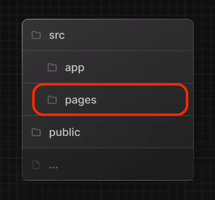Next.Js Pages Router
NextJs 的 pages 文件夹相比于 app 文件夹来说相对简单。
先来看目录结构。

路由
pages 文件夹根目录对应根路由,根目录里的 index.tsx 会对应到路由 /。
里面的每个子文件对应下一级路由,例如 dashboard 文件夹下的组件 index.tsx 就会被渲染到路由的 /dashboard。
动态路由
我们可以命名 /blog/[id].tsx 来接收路由的动态参数。这样路由 /blog/1, 在 [id].tsx 组件中就能接收到 { id: '1' }。
import { useRouter } from 'next/router'
const Blob = () => {
const router = useRouter()
return <p>Post: {router.query.id} </p>
}
export default Blob;
当让你可以接住很多 query 参数 [...id].tsx
| URL | Params |
|---|---|
| /blob/1/2/3 | { id: ['1', '2', '3'] } |
| /blob/1 | { id: ['1'] } |
也可让 query 参数可选 [[...id]].tsx
| URL | Params |
|---|---|
| /blob | { id: undefined } |
| /blob/1 | { id: ['1'] } |
Custom App
作为page router里最有意思的一个特性 _app.tsx。
Next.Js 使用 APP 组件来初始化每一个 page,我们可以重写这个组件!这个组件全局只能有一个。
import type { AppProps } from "next/app";
const LeanNextJsApp = ({ Component, pageProps }: AppProps) => {
return (
<>
<Component {...pageProps} />
</>)
}
export default LeanNextJsApp
这个组件就有意思了,作为整个应用最顶层的组件。 每次路由变化的时候,该路由对应的 component 在被渲染之前,都会被传入这个组件。也就意味着,可以控制宣布渲染这个组件,或者是怎么渲染这个组件。
首先我们可以在这里添加自定义的 <head> <script> 到 HTML 里。
import type { AppProps } from "next/app";
import Script from "next/script";
import Head from "next/head";
const LeanNextJsApp = ({ Component, pageProps }: AppProps) => {
return (
<>
<Head>
...html header
</Head>
<Script>
...script
</Script>
<Component {...pageProps} />
</>)
}
export default LeanNextJsApp
我们可以通过配置组件的 key 属性,来决定对组件的渲染
import type { AppProps } from "next/app";
export type NextPageWithKey<P = {}, IP = P> = NextPage<P, IP> & {
key: string
}
type AppPropsWithKey = AppProps & { Component: NextPageWithKey }
const LeanNextJsApp = ({ Component, pageProps }: AppPropsWithKey) => {
// ...Get valied root key from api
if (!Component?.name || !valiedKey.include(Component.key)) {
return <NotFound />
}
return (
<>
<Component {...pageProps} />
</>)
}
export default LeanNextJsApp
import type { NextPageWithKey } from "@/pages/_app";
const BlobA: NextPageWithKey = () => {
return <div>Blob A</div>
}
BlobA.key = "blobA"
export default BlobA
Custom Error
export default function Custom404() {
return <h1>404 - Page Not Found</h1>
}